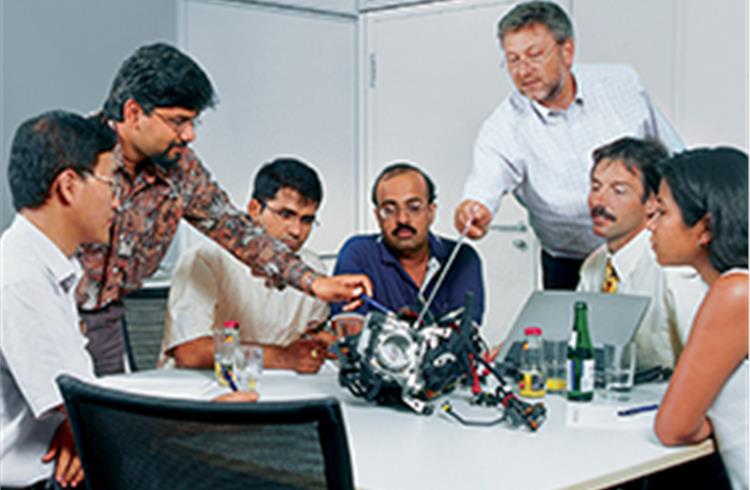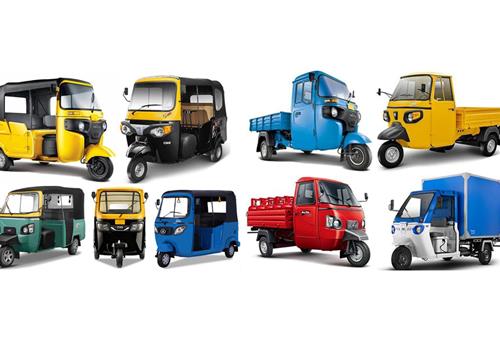Auto sector faces huge talent pool crisis
Everyone knows that there is a huge crisis that the industry is battling and yet hardly anyone is looking towards it. Most top-of-the-rung executives are saying “We are not getting the right people”! Story: Taarun Dalaya
Executives at Indian automotive companies are travelling extensively within the country and abroad, corporate strategists are mapping five to 10-year strategies for their companies, capacity expansion and new investments in plant and machinery are taking place, hundreds of hours are being spent on business meetings. The picture looks bright, vibrant and busy. But wait! Everyone knows that there is a huge crisis that the industry is battling and yet hardly anyone is looking towards it. Most top-of-the-rung executives are saying “We are not getting the right people”!
SERIOUS ISSUE
What does this actually mean? Shortage of well-qualified and quality engineers, a talent glut, dearth of knowledge workers, paucity of “change agents”, lack of good managers -- describe the situation in any of these expressions but it all leads to a serious human resource-related problem. Many non-automotive companies too in India’s manufacturing sector are facing this problem. Larsen & Toubro’s chairman and managing director, AM Naik recently voiced his concern in a business newspaper saying that his company was not getting the right kind of engineers it needs.
The same thoughts are being voiced by the automotive industry and terribly so by the auto component sector. This article is hence more about the latter and the canvas of this serious issue is large and in varied forms. Take the automotive clusters, for instance, which are being run in the country to enhance many aspects of a company’s manufacturing, in fact business on the whole -- be it in productivity, inventory management, shopfloor re-design, or quality initiatives like total productive maintenance (TPM), total quality management (TQM), 5S, Lean manufacturing, Six Sigma, among others. Most of them primarily have auto component makers on their radar screens.
VR Janardhanam, the national president of The National Institution for Quality and Reliability (NIQR) says that the institute is currently running what is termed as a supplier quality improvement programme through which it is imparting TQM via a cluster of 60 companies mainly belonging to the small scale sector and comprises those mostly from the automotive sector. NIQR also runs another heterogeneous cluster in the Ambattur Industrial Estate in Chennai which includes a textile company, a company which makes electrical control panels and another which makes oil seals for various applications.
“Four to five years ago, there was a dearth of HR professionals in the industry and now there is a dearth of quality management professionals,” he says. There is a situation of shortage alongside a situation of attrition where companies are luring quality professionals at higher emoluments.
The clusters being run by the ACMA Centre for Technology and the UNIDO Partnership Programme (between itself, the government and the Automotive Component Manufacturers Association of India) are themselves facing a severe crunch of getting counsellors. There is a huge demand from companies to be exposed to the work being done by these bodies through clusters, but who will run them?
##### ONUS ON COUNSELLORS
The one-year, TQM-based cluster being run by NIQR has allotted each faculty-member (counsellor) five companies and the person has to make 52 visits to each company within the year. This is the level of strain that the counsellors in these clusters have to take. As a result these organisations are turning to various means of recruitment. The ACT and UNIDO bodies are approaching companies to loan their knowledge workers to work as faculty on company visits while NIQR has adopted what it calls the “WAR” approach, that stands for “Working after Retirement”, where it recruits retired professionals who can still make an impact.
It has also posted a “Quality Registry” on its website which states that “NIQR is looking for quality counsellors for quality improvement in manufacturing and service industries and trainers in quality-related subjects” and has uploaded an application form for interested people to apply – a separate one for counsellors and another for trainers. It is not just bodies such as these that are coping with paucity. Auto component companies are unable to get appropriate knowledge workers who could become catalysts at several operational rungs of a company and propel it towards the growth opportunities that are coming its way.
Highly qualified engineers are moving to more lucrative jobs in the IT sector and if at all they get roped in into the automotive sector, then they wish to join a “big” company especially a multinational. This fact apart when one looks at the huge size of the Indian auto component industry, which mainly contains SMEs, after weeding out the big groups or even well-to-do single entities, there are hundreds of enterprises which are still functioning in very archaic ways and are more or less “one-man show” family enterprises.
Either they cannot afford top-of-the-class people to fit into the managerial, operational and technical functions of their companies or they believe that they know it all. On the other hand many smart, intelligent and clever knowledge workers find themselves not getting the right kind of exposure or training because of psychological insecurities of their seniors or as a result of the subtle pressures that their peers build to stall their growth.
APATHY TO REALITY
The top management at a large number of companies either have a lackadaisical approach to the realities of the competitive onslaught that has come and will come the industry’s way, with a ferocity they cannot imagine, or they are riding on their past successes. They are not being the change agents that they need to be nor infusing or allowing existing people to be those agents.
In 1997, Yoshikazu Tsuda, a counsellor with the Union of Japanese Scientists and Engineers, who was persuaded by the Confederation of Indian Industry and Maruti Udyog (MUL) to work with two clusters of MUL in the area of TQM once said in an interview with a business magazine that “Indian managers lack initiative. If somebody tells them to do something they do it better than anybody else. But they never do it on their own.”
Like his fellow countryman Sueo Yamaguchi who came to India in 1998 from the Japan Institute of Plant Maintenance to work on TPM with clusters here, Tsuda was very particular that change should take place from the top and with commitment from the top. Yamaguchi was quoted as saying,“If the top management is not interested, I do not waste my time with the company. Most top managements are not interested. They think TPM is cleaning. It is a question of approach and a change of mindset”.
The Deming Prize is a very prestigious award and reflects the high levels of quality and operational expertise of an awardee company. It definitely does have an impact on the company’s business-obtaining potential. There are a few of these in the auto component industry who have been awarded the Deming Prize and that is a remarkable thing. But how many companies can monetarily afford to work towards getting this prize (which is understood to entail a cost of up to Rs 1 crore)?
Tsuda and Yamaguchi are both instrumental in helping several auto component companies upscale their expertise and competencies and are fanatically revered among enterprises in India. There visits are very expensive and people like them are limited. But the bigger reality is that they and others like them from other countries are just visitors. They come and they go. The crux of the matter is that the large mass of auto component makers need their own home-grown Tsuda-Sans and Yamaguchi-Sans who would be perennially available to their employers -- agents of change, knowledge workers, catalysts of growth – but where are they?
##### A quality counsellor Autocar Professional spoke to said, “There are just a few who are skilled to take the leap forward and these few are moving from enterprise to enterprise. But this does not help in the long run.” Yes, attrition levels are known to be high and the more MNCs that get into the auto component industry, or other sectors, the more they will entice to get the cream.
It takes years of experience for a manager, technician or quality management professional to learn the skills that he or she attains. An engineer or manager gathers the basic theoretical knowledge at their educational institutions but they are not taught things like TQM, quality assurance and quality planning. Those who acquire skills in these areas are either self-taught, have been exposed to training programmes or have had the opportunity to work with leading companies where such concepts were being practiced by virtue of their overseas collaborations. Which means that college curriculum does not well-prepare their graduates for the real world.
These human resource-related issues have a big bearing on the overall quality of enterprises and eventually the products being manufactured by them. It is not much talked about but it is known that there are companies which do re-work on their exported products in warehouses in countries like the US. These after they are re-worked are then supplied to customers. What is spent is lots of money and also time.
The worrying thought is with these realities how can SMEs cope? How can they hope to become competitive, best in class, and even become exporters to more mature and competitive markets and customers? The “aspirational” revenue which Indian auto component manufacturers expect to obtain by 2015 is in the range of $33-40 billion according to an ACMA-McKinsey & Co. report, of which $20-25 billion is expected to come from exports. Numerically, keeping in mind the compound annual growth rate of the industry, the current levels of performance and the business basket that is available, it all seems achievable perhaps. But then the reality on the ground says otherwise.
KNOWLEDGE WORKERS
In a survey that well-known management thinker and writer Peter Drucker wrote for The Economist in 2001 titled “The Next Society”, he said, “The means of production is knowledge which is owned by knowledge workers and is highly portable. “Knowledge workers provide “capital” just as much as does the provider of money. The two are dependent on each other. This makes the knowledge worker an equal – an associate or partner.”
What the industry therefore passionately needs at the moment are knowledge workers. Companies will have to work hard on getting, training and retaining the best human resource and will have to begin their efforts at the source – which is educational institutions. Industry will have to work very closely with academia to create a path where tomorrow’s managers, operational and technical professionals are created well-before they move a step ahead from educational institutions to the enterprise.
The National Manufacturing Competitiveness Council, if it is not already aware, should take cognisance of the critical human resource issues besetting the industry and could perhaps constitute a Task Force comprising academia, industry professionals and relevant government officials to study the problems on hand together and map out solutions. The Indian auto component industry has been performing remarkably well and holds a promising future but it should be cautious to not let today’s success become the cause of tomorrow’s failure.
RELATED ARTICLES
Mahindra XUV300 tops 250,000 sales ahead of XUV3XO reveal
The popular compact SUV, which ranks among India’s Top 20 utility vehicles for FY2024, is among the SUVs which have powe...
Bajaj Auto sells 463,413 three-wheelers in FY2024, increases market share to 67%
Three-wheeler market leader Bajaj Auto increases its dominance in both passenger and cargo model sales with best-ever fi...
SCOOP! TVS Motor begins exporting made-in-India BMW CE 02 e-scooter
TVS Motor Co, which has a longstanding strategic partnership with BMW Motorrad since April 2013 for manufacture of the 3...





 By Autocar Pro News Desk
By Autocar Pro News Desk
 14 Aug 2006
14 Aug 2006
 3280 Views
3280 Views









